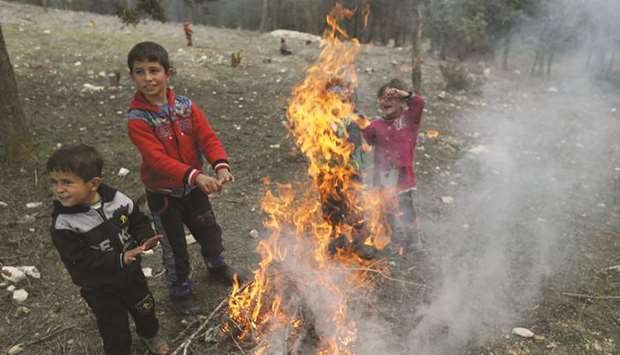A Russian-backed regime offensive in northwest Syria has displaced 900,000 people since the start of December, and babies are dying of cold because aid camps are full, the UN said yesterday.
That figure is 100,000 more than the United Nations had previously recorded.
“The crisis in northwest Syria has reached a horrifying new level,” said Mark Lowcock, the UN head of humanitarian affairs and emergency relief.
He said the displaced were overwhelmingly women and children who are “traumatised and forced to sleep outside in freezing temperatures because camps are full.
Mothers burn plastic to keep children warm. Babies and small children are dying because of the cold.”
The Idlib region, including parts of neighbouring Aleppo province, is home to some 3mn people, half of them already displaced from other parts of the country.
The offensive that began late last year has caused the biggest single displacement of people since the conflict began in 2011.
Lowcock warned yesterday that the violence in the northwest was “indiscriminate.”
“Health facilities, schools, residential areas, mosques and markets have been hit.
Schools are suspended, many health facilities have closed.
There is a serious risk of disease outbreaks.
Basic infrastructure is falling apart,” he said in a statement.
“We are now receiving reports that settlements for displaced people are being hit, resulting in deaths, injuries and further displacement.”
He said that a massive relief operation underway from the Turkish border is has been “overwhelmed.
The equipment and facilities being used by aid workers are being damaged.
Humanitarian workers themselves are being displaced and killed.”
US President Donald Trump on Sunday called for Russia to end its support for the Syrian regime’s “atrocities” in the Idlib region, the White House said.
FULL CONTROL
The Syrian army said yesterday it had taken full control of dozens of towns in Aleppo’s northwestern countryside and it would press on with its campaign to wipe out militant groups “wherever they are found”. The advances were made after President Bashar al-Assad’s forces drove insurgents from the M5 highway linking Aleppo to Damascus, reopening the fastest route between Syria’s two biggest cities for the first time in years in a big strategic gain for Assad.
Assad said his forces’ rapid recent gains presaged the eventual defeat of the nine-year insurgency that sought to oust him from power.
But in an appearance televised by state media, he also cautioned that the conflict was not yet over.
“We know this liberation does not mean the end of the war or the crushing of all plots or the end of terror or the surrender of the enemy, but it definitely rubs their noses in the dirt,” Assad said. “This is a prelude to their (opposition forces’) final defeat, sooner or later.”
Backed by heavy Russian air strikes and aided by militias, government forces have intensified since the start of the year their campaign to recapture the Aleppo countryside and parts of neighbouring Idlib province in the far northwest of Syria where anti-Assad insurgents hold their last strongholds.
Russian and government air strikes yesterday hit Darat Izza, near the Turkish border about 30km north of Aleppo city, wounding several civilians and forcing two hospitals to close, according to hospital staff.
Witnesses also reported air strikes in southern areas of Idlib province in what the opposition said was a “scorched earth policy” that has left dozens of towns and villages in ruins.
The advances sent hundreds of thousands of Syrian civilians fleeing towards the border with Turkey in the biggest single displacement of the nine-year-old war.
Turkey and Russia began a new round of talks in Moscow yesterday after several demands by Ankara that Assad’s forces should back down and a ceasefire be put in place.
Russian Foreign Minister Sergei Lavrov said that militant attacks on Russian bases and Syrian positions have continued and “it is not possible to leave this unanswered”.
“Troops from Russia and Turkey on the ground in Syria, in Idlib, are in constant contact with each other, looking at changes in the conditions.

Internally displaced children warm themselves around a fire in Qatmah village, West of Azaz, yesterday.
